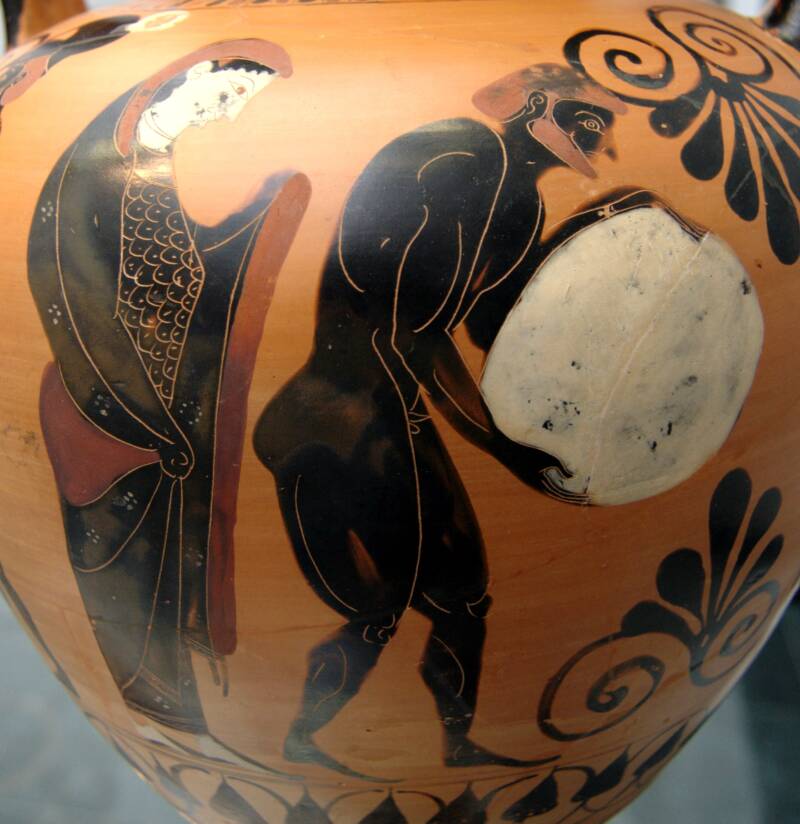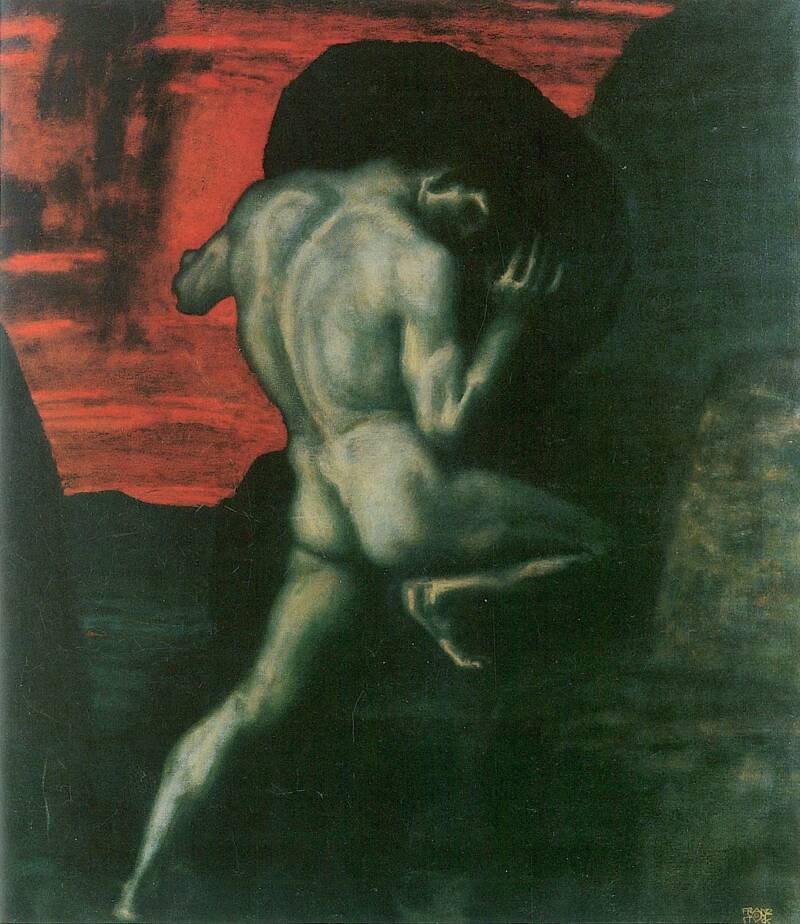The cunning king of Ephyra in Greek mythology, Sisyphus cheated death twice — then faced the eternal punishment of endlessly pushing a stone up a hill.

Artepics/Alamy Stock PhotoSisyphus was condemned to eternally push a boulder uphill, only for it to roll back down.
Sisyphus appears in several Greek myths, though today he is often associated with just one. In the famous legend, he is punished by Zeus for cheating death and condemned to endlessly push a boulder up a hill, only for it to inevitably roll back down. The myth was given new life in 1942 by the philosopher Albert Camus in his work The Myth of Sisyphus, which draws comparison between the absurdity of life and Sisyphus’ punishment.
“The struggle itself toward the heights is enough to fill a man’s heart,” Camus wrote in his essay. “One must imagine Sisyphus happy.”
While it’s easy to focus on Sisyphus’ fate — which likely sounds torturous to most people — he served a bigger role in Greek mythology than just his punishment. He was the king of Ephyra, supposedly the original name of Corinth, and he founded the Isthmian Games. He appeared in the epics of Homer as a cunning, trickster-like figure. And, most notably, he betrayed Zeus by telling the river god Asopus the whereabouts of his daughter Aegina after Zeus had kidnapped her, thus earning him Zeus’ wrath.
Then, Sisyphus caused turbulence among several gods by cheating death twice, eventually landing him the punishment of his eternal task in the underworld. But the reason for the specific punishment itself — pushing a stone up a hill — is a mystery that still perplexes scholars to this day.
The Role Of Sisyphus In Homer’s Epics
Sisyphus notably appears in the ancient Greek poet Homer’s Iliad. In the epic poem, the king is said to live in “a city in the heart of Argos, pasture land of horses, called Ephyra.” Though this mention in Iliad is brief, Homer does note that Sisyphus, the son of Aeolus, is “the craftiest of all humankind.”

Wikimedia CommonsA depiction of Sisyphus on ancient pottery.
The “craftiest” human is mentioned again in Homer’s Odyssey, when Odysseus recounts his journey to the underworld. While there, he observes Sisyphus engaged in his eternal punishment of rolling a boulder uphill, only for it to roll back down each time he nears the summit:
“Aye, and I saw Sisyphus in violent torment, seeking to raise a monstrous stone with both his hands. Verily he would brace himself with hands and feet, and thrust the stone toward the crest of a hill, but as often as he was about to heave it over the top, the weight would turn it back, and then down again to the plain would come rolling the ruthless stone. But he would strain again and thrust it back, and the sweat flowed down from his limbs, and dust rose up from his head.”
From Homer’s descriptions alone, it’s clear that Sisyphus was a clever man. He was also the ruler of what would later be known as Corinth. And for some unknown reason, he was condemned to endlessly push a boulder up a hill in the underworld. Obviously, there was a lot that Homer had left out.
Other authors thankfully filled in these missing details, fleshing out the doomed character, as well as the reasons for his punishment.
Betraying Zeus, Cheating Death Twice, And Enduring An Eternal Punishment

Galerie Ritthaler/Wikimedia CommonsSisyphus by Franz von Stuck.
According to Greek legends, Sisyphus was not only the founder of Ephyra, but also the Isthmian Games, held every two years in honor of Poseidon. In some versions of the myth, Sisyphus originally founded the games in honor of Melicertes, a Boeotian prince who was later transformed into a sea god. In others, he founded the games after being instructed to do so by nymphs.
His first big slight against the gods happened when the river god Asopus set out in search of his daughter Aegina. Zeus, as he was wont to do, had kidnapped Aegina. Sisyphus informed Asopus that he could identify Aegina’s abductor — but only if Asopus provided his city with an eternal spring of water. Asopus agreed, and Sisyphus revealed that Zeus had taken Aegina.
Naturally, Zeus did not take this well.
So, when it came time for Sisyphus to die, Zeus sent Thanatos, the Greek personification of death, to escort the king to the underworld — odd, since it was typically the job of Charon to escort the souls of the dead. Suspicious and feigning curiosity, Sisyphus asked Thanatos to demonstrate how the chains intended for him worked. Obliging, Thanatos ended up trapping himself, allowing Sisyphus to imprison Thanatos in his own chains.

Detroit Institute of Arts/Wikimedia CommonsSisyphus by Giovanni Battista Langetti.
With Thanatos bound, however, no mortal could die. Not only did this disrupt the natural order, but it also caused frustration for the gods. In particular, Ares, the god of war, felt that battles had lost their fun, since none of the soldiers could die. Furthermore, people who were old and on the brink of death began to suffer greatly, with no end of their suffering in sight.
Eventually, Ares intervened to free Thanatos and restore the cycle of life and death. Of course, this also meant that Sisyphus was in danger of dying again. Facing his imminent demise, he instructed his wife Merope to neglect the customary burial rites for him and leave his body unburied.
Then, after being sent to the afterlife, he complained to Persephone, the queen of the underworld who had infamously been abducted by Hades, that his wife had shown him great disrespect by not burying him. Persephone, swayed by Sisyphus’ words, granted him permission to return to the world of the living to “punish” Merope — and once again, he had escaped death.
He couldn’t escape death forever, though. Hermes, the messenger god, eventually dragged Sisyphus back to the underworld, and Zeus soon condemned Sisyphus to the eternal task of rolling a boulder uphill, only for it to roll back down. Unable to cheat death anymore, the once-cunning king was condemned to an eternity of frustration and useless effort.
Most people would consider this a miserable existence in the afterlife. Even today, the term “Sisyphean” is often used to describe an assignment, duty, or chore that requires continuous effort and labor, but never seems to be completed or yield any reward. However, the 20th-century philosopher and writer Albert Camus took a closer look at the famous Greek legend while exploring his philosophy of the absurd, concluding in The Myth of Sisyphus that the king’s eternal punishment might not be so bad, after all.
Albert Camus’ The Myth Of Sisyphus And The Philosophy Of The Absurd

Public DomainAlbert Camus, a French philosopher who explored absurdity.
Albert Camus was highly influenced by the work of other philosophers, especially Søren Kierkegaard, Arthur Schopenhauer, and Friedrich Nietzsche. These influences eventually led Camus to his philosophy of the “absurd,” which describes the juxtaposition of humanity’s need to find meaning in life and the “unreasonable silence” of the universe in response.
Camus explored this idea through the tale of Sisyphus, using the Greek figure’s eternal punishment as a metaphor for the human condition. In the work, Camus suggests that, like the doomed king, humanity persists through repetitive and seemingly pointless tasks, seeking purpose in a world that is devoid of inherent meaning. But if that all sounds like doom and gloom, worry not. Camus suggests that this could, in fact, be something positive.
Rather than succumbing to despair, Camus argues that individuals can find contentment by embracing the absurdity of their existence. He argues that, upon recognizing the absurdity of life, humanity faces a choice: to escape existence through suicide, to seek refuge in religious or spiritual beliefs, or to accept the absurd and continue living, which he calls “revolt.”
In revolting, humans can create their own purpose and find fulfillment through the simple act of living itself. Camus sums this up in saying:
“I leave Sisyphus at the foot of the mountain! One always finds one’s burden again. But Sisyphus teaches the higher fidelity that negates the gods and raises rocks. He too concludes that all is well. This universe henceforth without a master seems to him neither sterile nor futile. Each atom of that stone, each mineral flake of that night filled mountain, in itself forms a world. The struggle itself toward the heights is enough to fill a man’s heart. One must imagine Sisyphus happy.”
Next, read about Nyx, the primordial Greek goddess of the night who was able to scare Zeus into submission. Then, learn about some of the most mesmerizing mythological creatures from around the world.





